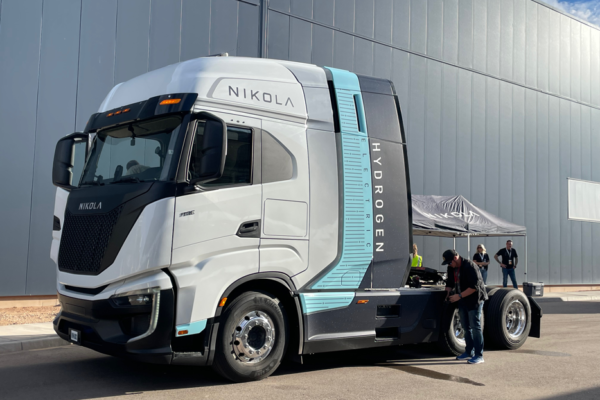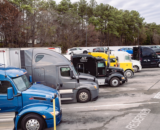Article created for the January digital issue of
Hydrogen trucks offer long driving range and fast refueling, which can make them an attractive option for heavy-duty trucking operations. Manufacturers are working on Class 8 hydrogen tractors, and several are already testing the technology on the road.
“Engine manufacturers and Class 8 manufacturers are looking at hydrogen and getting in the game,” said Randy Gard, chief operating officer of Bosselman Enterprises.
Two Primary Pathways – Vehicles Powered by Internal Combustion Engines or Hydrogen Fuel Cell Electric Vehicles
There are two primary paths hydrogen technology can take—vehicles powered by internal combustion engines (ICEs) that run on hydrogen or hydrogen fuel cell electric vehicles (FCEVs) with hydrogen generating the power needed to charge the batteries.
“These are two different technologies. I think it is similar to VHS or Beta in terms of which one will rule,” Gard said, adding that Cummins is currently the front runner on the ICE side. “If they can make an ICE engine work on hydrogen, I think that will win out.”
Cummins Inc. Develops Two Hydrogen-fueled Engines
Cummins Inc. has announced the development of two hydrogen-fueled engines—the X15H engine and the B6.7H engine—designed for the commercial vehicle and equipment markets.
“Our fleet customers have shown tremendous enthusiasm for Hydrogen internal combustion engines, which we believe can be a breakthrough technology essential to reaching Destination Zero,” said Jim Nebergall, general manager, Cummins Hydrogen Engine Business. “With enough interest, we believe we can manufacture this technology at scale yet this decade providing customers with an option that is a low initial cost, extended vehicle range, powertrain installation commonality, and end user familiarity.”
Werner Enterprises is working with Cummins to validate a 15-liter hydrogen internal combustion engine in its vehicles. "The options Cummins is providing align with our longstanding focus on sustainability and reducing our carbon footprint,” said Derek Leathers, CEO of Werner Enterprises.
In 2022, Cummins Inc. announced its partnership with Daimler Truck North to upfit and validate Freightliner Cascadia trucks with a Cummins hydrogen fuel cell powertrain for use in North America. Upon successful validation, the companies said they intend to have initial units available this year for selected customers.
Toyota’s Heavy-duty Fuel Cell Electric Powertrain Certified as a Zero-Emission Powertrain
The California Air Resources Board recently certified Toyota’s heavy-duty fuel cell electric powertrain kit as a Zero-Emission Powertrain. “Having suppliers with established names helps OEMs plan new vehicle options, but the OEMs still control when and how many products launch,” said Rick Mihelic, director of emerging technologies for the North American Council for Freight Efficiency.
Toyota Motor North America and Kenworth Truck Co. have worked together on the “Shore to Store” project at the Port of Los Angeles, the Los Angeles basin and the Inland Empire that tested their jointly designed heavy-duty, Class 8 fuel cell electric vehicles. Kenworth designed and built the Class 8 T680 FCEVs, while Toyota designed and built the powertrain’s fuel-cell electric power system, fueled with hydrogen. Toyota said the project, which had 10 trucks serving real-world customers, was a success.
Nikola Starts Production
Nikola has started production of its Class 8 hydrogen fuel cell vehicles and said it expects deliveries to begin later this year. The company has received more than 200 orders from 18 end customers for the trucks, which features a range of up to 500 miles and an estimated fueling time of approximately 20 minutes.
The Alberta Motor Transport Association has partnered with Nikola Motor Corp. and Canadian fleets for AMTA’s Hydrogen Commercial Vehicle Demonstrations project. Through the program, Alberta-based commercial carriers can test the heavy-duty commercial vehicles within their day-to-day operations.
The project launched in July and will run for two years. “We are excited to put this truck to work in Alberta and begin collecting performance data and raising awareness about this advanced technology,” said Doug Paisley, AMTA board chair. “Promoting early adoption helps boost industry confidence in such innovative technology.”
Bison Transport is among the fleets taking part in the project. “This vehicle deployment is a large step towards understanding the operating characteristics of a zero-emission vehicle in day-to-day operations,” said Mike Gomes, vice-president, maintenance, Bison Transport.
Hyundai Motor Co.’s has Plans
Hyundai Motor Co.’s has announced its plans to ramp up the U.S. commercial vehicle market entry with its XCIENT fuel cell trucks, which the company plans to test in drayage operations in California. Hyundai already deploys the Xcient in Germany, Switzerland, Korea, New Zealand and Israel.
“We believe that there is no way around hydrogen to realize the energy transition towards renewables. And amongst others, it also offers already today a practical and viable solution to decarbonize the heavy-duty commercial vehicle sector providing excellent drive range, payloads and refueling time on our trucks,” said Mark Freymueller, senior vice president and head of commercial vehicle business innovation at Hyundai Motor.
Volvo Trucks and Daimler Truck Partner
Volvo Trucks showcased its hydrogen fuel cell trucks in 2022 and is testing the technology, developed as part of joint venture with Daimler Truck, above the Article Circle in the north of Sweden.
“Trucks are operating seven days a week and in all types of weather. The harsh conditions on public roads in northern Sweden, with ice, wind and lots of snow, make an ideal testing environment,” said Helena Alsiö, vice president powertrain product management at Volvo Trucks. “I am pleased to say that the tests are going well, confirming tests we carried out beforehand, both digitally and on our confined test track close to Gothenburg.”
Hyzon has Completed 15 Commercial Vehicle Trials
Hyzon Motors Inc. has finished testing its heavy-duty fuel cell electric vehicles with Performance Food Group Inc., a food and foodservice distribution company. The truck completed deliveries to eight PFG customers near Dallas, Texas, travelling over 540 miles on a 16-hour continuous run, which Hyzon said demonstrates the viability of on-board liquid hydrogen to fuel long-distance, zero-emission transport.
“The results we captured in the strenuous demo through Central Texas’s diverse terrain and summer heat make us optimistic that, once commercialized, our liquid hydrogen vehicle powered by our proprietary 200kW fuel cell system should be able to provide long distance range between 650 and 800 miles, on par with many diesel truck range requirements,” said Parker Meeks, CEO of Hyzon.
Hyzon has completed 15 commercial vehicle trials in North America since March 2022. Other fleets taking part include Airgas, Bison Transport, Pilot Company, Talke, and Total Transportation Services in North America, and Hylane and MPREIS in Europe. "The initial trial periods allow both customers and Hyzon to develop learnings at a small scale, building the foundation for success in multi-vehicle fleet deployments," Meeks said.
Daimler Trucks North America Working with the U.S. Department of Energy
Daimler Trucks North America is working with the U.S. Department of Energy as part of the SuperTruck3 program. DTNA received just under $26 million to develop and demonstrate two Class 8 fuel cell trucks that achieve a range target of 600-miles for regional and long-haul applications.
Smaller classes of vehicles also received funding through the SuperTruck 3 program. Ford Motor Company was awarded nearly $25 million to develop and demonstrate five hydrogen fuel cell electric Class 6 Super Duty trucks and General Motors received more than $26 million to develop and demonstrate four hydrogen fuel cell and four battery-electric Class 4-6 trucks.
SuperTruck 3 designs are planned to be revealed by the end of 2025.
// This article was created for Stop Watch magazine, the magazine of the NATSO Foundation. The NATSO Foundation is the research, education and public outreach subsidiary of NATSO, Inc. The NATSO Foundation provides programs and products to strengthen travel plazas’ ability to meet the traveling public's needs through improved operational performance and business planning. Visit www.natsofoundation.org for more information. (Donate to the NATSO Foundation here.)
Subscribe to Updates
NATSO provides a breadth of information created to strengthen travel plazas’ ability to meet the needs of the travelling public in an age of disruption. This includes knowledge filled blog posts, articles and publications. If you would like to receive a digest of blog post and articles directly in your inbox, please provide your name, email and the frequency of the updates you want to receive the email digest.




